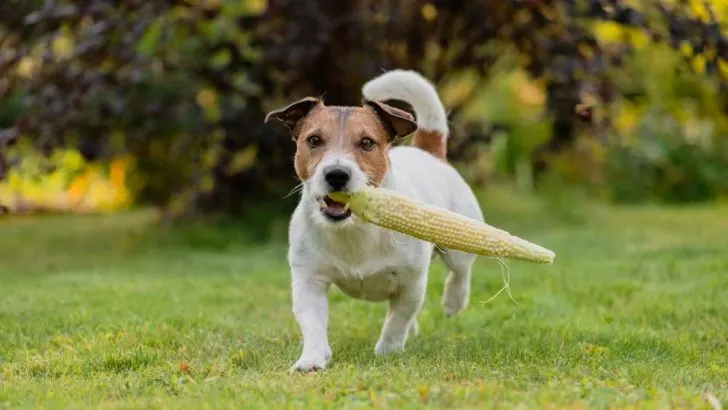Corn is a staple food all around the world. It’s easy to produce in large quantities, and you can use it in various ways. Can dogs eat corn cobs, though?
Corn is a tasty everyday snack. The pleasant smell of boiled corn on a cob will surely attract the attention of your dog. You may be tempted to feed your dog corn on a cob, but is it safe for him?
In this article, we will talk about feeding your dog corn cob and if it’s safe for your pet or not, so read on!
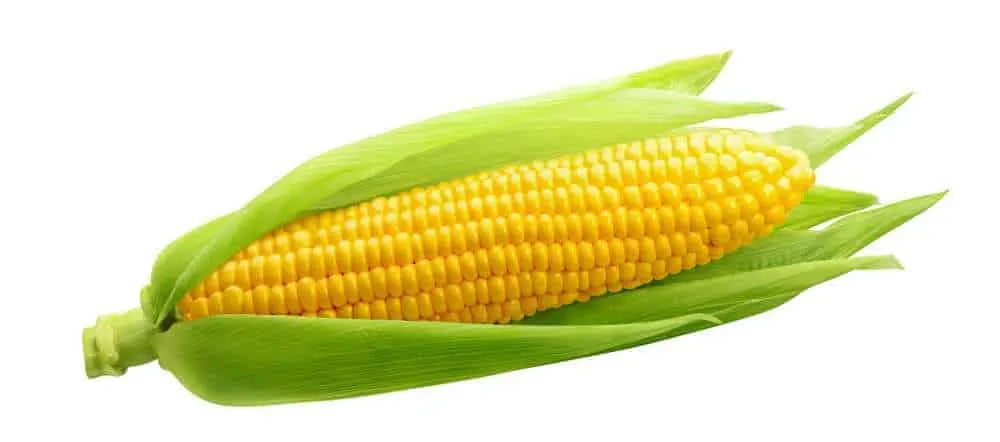
Is Corn Cob Safe For Dogs?
To put it simply – NO! While the actual corn doesn’t pose a danger to your dog’s health, if it eats the cob, it can have serious health issues.
Dogs love to chew on corn cobs, it’s good for their teeth, and they love the taste of it. As long as your pet is just chewing it, there is no need to worry.
The danger comes from your dog swallowing the cob. Their tummies can’t digest the whole cob, so they can develop severe intestinal problems or even choke!
If your canine ends up swallowing a corn cob, it can pose a major health concern for your beloved pet. It will clog up its stomach, cause choking, or, in the worst-case scenario, internal bleeding.
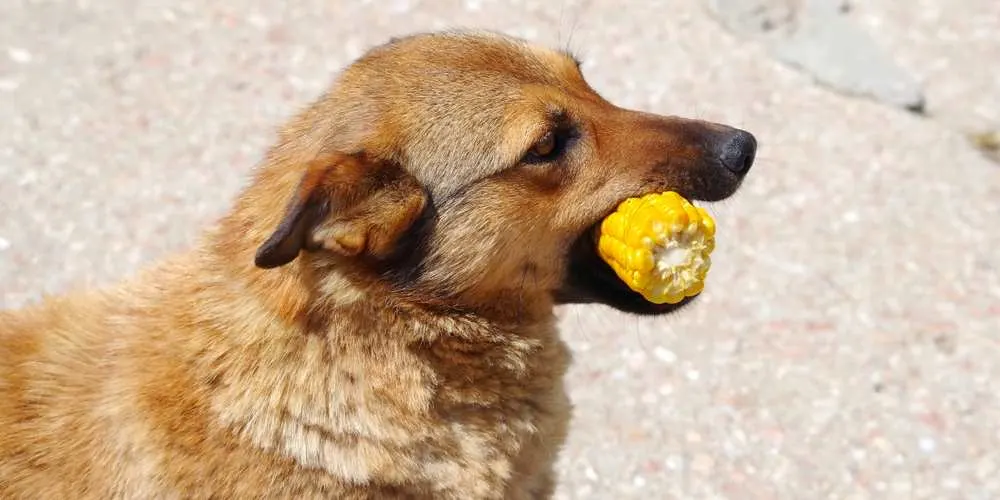
Signs Your Dog Has Intestinal Blockage
It can be hard to notice when your dog has health problems after swallowing a corn cob. Days can go by since your pet has ingested a cob, and you wouldn’t be aware that its stomach is blocked.
Here are some symptoms which are a clear sign your dog is having tummy problems:
- Heaving – if your dog is having trouble breathing, it’s a sign that its airways are potentially blocked by the corn cob.
- Loss of appetite – Because your dog’s stomach can’t digest the cob, it’s gonna stay full and won’t make your dog hungry.
- Abdominal Discomfort – If you notice your pup trying to avoid lying on its stomach, it can be a sign of abdominal pain or discomfort caused by the swallowed cob.
- Lethargy – If your four-legged friend isn’t as energetic as usual, it can be a cause for concern.
- Vomiting – The stomach will try to get the cob out on its own, but sometimes it won’t succeed, and your pup will need your help.
- Constipation – Your canine friend will have difficulties while defecating. The corn cob won’t let any other food pass through the stomach.
- Diarrhea – Another sure sign that your dog’s tummy isn’t feeling very well.
- Thick, black stools – This is the most alarming symptom. It means that the corn cob has damaged the intestine wall, and the black stool comes from digested blood from the wound.
You shouldn’t panic right away. The signs can indicate many other less severe problems, but you should always take action when you see something wrong with your pet.
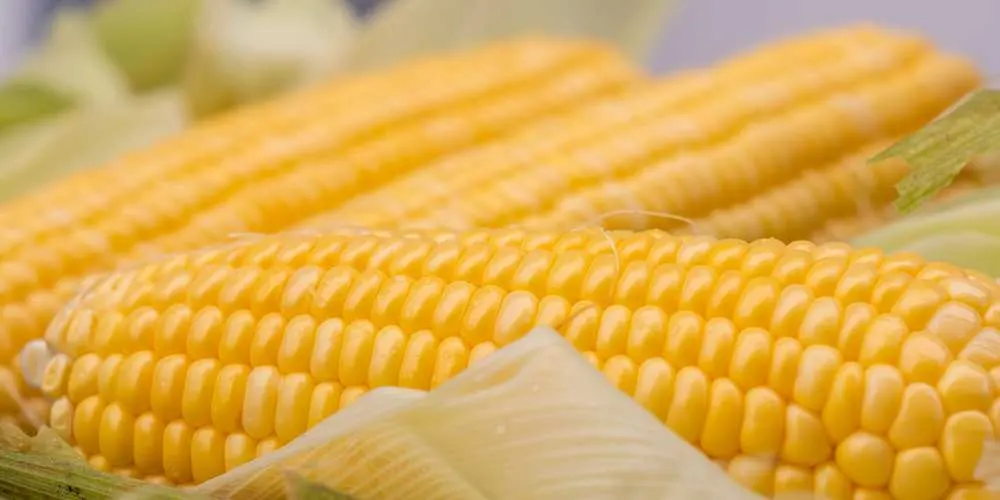
Steps To Take If Your Dog Eats A Cob
If you notice any of the symptoms mentioned above, take your dog to the veterinarian as soon as possible. Swallowing a cob of corn is a health emergency for your pet.
You will not be able to help your pet on your own if it has swallowed a corn cob. Never try to induce vomiting because that can cause problems for your dog’s health. Do that only if you are told so by your vet. When you take your pet to the vet’s office, he will conduct a physical examination of your dog. He may also analyze the dog’s blood and do an X-ray scan of its stomach.
If the swallowed cob is causing a blockage in the stomach, it might be necessary to perform surgery to remove it. Don’t worry, your dog won’t feel a thing because the surgery is done with general anesthesia.
After the corn cob causing the problem is taken out, your beloved pet will be back to running around in no time.
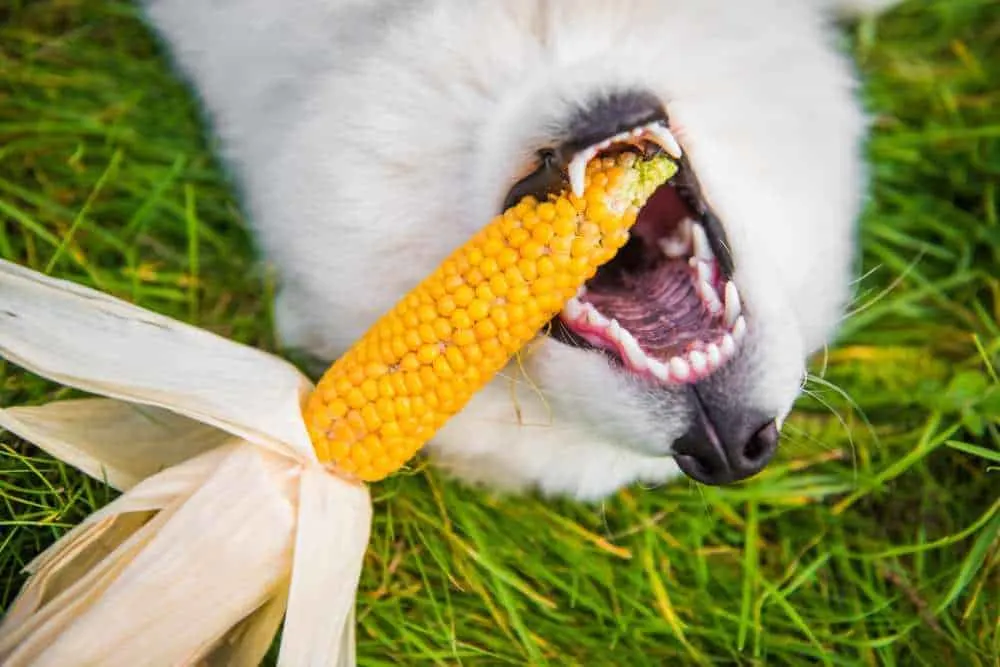
How To Prevent Your Dog From Eating Cobs?
It can be hard work stopping your dog from eating things it shouldn’t. All dogs love treats, and corn cob is no exception. They will still feel the smell of corn after you’ve eaten it off the cob, so they may try to get the cob even after you throw it away.
There are some precautions you can take to stop your dog from getting to the cob.
When you’re done treating yourself with corn on a cob, don’t just throw it in the trash if your pet has easy access to the trash bin. Instead, to be safe, throw it in an outside bin or one your dog can’t access.
It would be good to throw the cobs in a garbage disposal bin, which has a door secured by a lock. Raccoons are famous for ravaging garbage bins, and they can take out the cobs which your dog can then pick up.
Don’t make birdhouses in your yard if that’s the area where you keep your garbage bin. Birds can pick up small corn cobs and leave them all around the yard. This way, your pet will also have easy access to corn cobs.
If you are making a cob stockpile for other uses around the house, be sure to keep it in a locked room so your pet can’t get in there.
If you’re having guests, make sure to inform them that corn cobs are off-limits for your four-legged friend.
Your guests may want to give the dog table scraps after dinner, but it’s best to avoid that altogether.
You can also draw your pet’s attention away from corn cobs by giving him some other treats to munch on while you finish your meal and dispose of it.
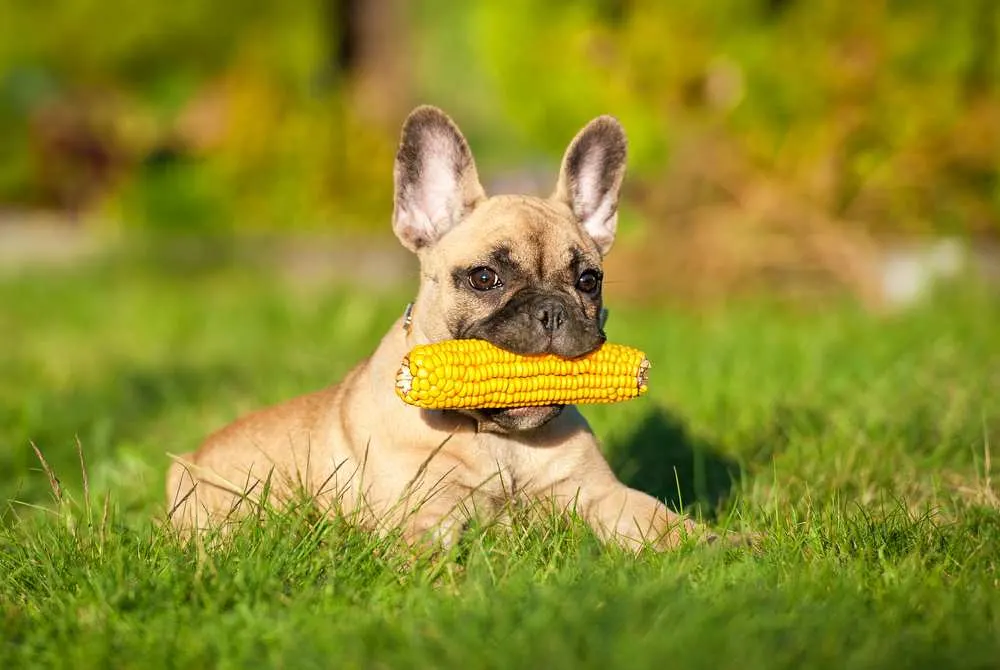
Is Corn Healthy For Your Dog?
Most dogs like the taste and smell of corn, so you can let your pup enjoy the snack from time to time.
Try not to go overboard with corn; in large quantities, it can be bad for your pet. Corn has a substance called xylitol, which can be bad for your canine’s teeth if consumed in high doses.
Corn does have some health benefits for your dog. It’s an excellent source of protein, carbs, fats, and antioxidants.
Protein is good for your dog to build and maintain muscle in its body. The carbs can also provide essential vitamins, fat, and fiber to your dog. The fiber will improve your pet’s gut health as well.
Fat is an essential micronutrient that all animals need to be healthy. Your four-legged friend is no exception.
Antioxidants help your dog’s immune system to fight off infections and keep him strong and healthy.
Nevertheless, you should stick to a varied and balanced diet for your dog. Feeding it too many snacks can cause malnutrition over time. This can further cause many other illnesses and problems which can simply be avoided.
Treats shouldn’t be a substitute for a healthy and nutrient-rich diet for your dog.
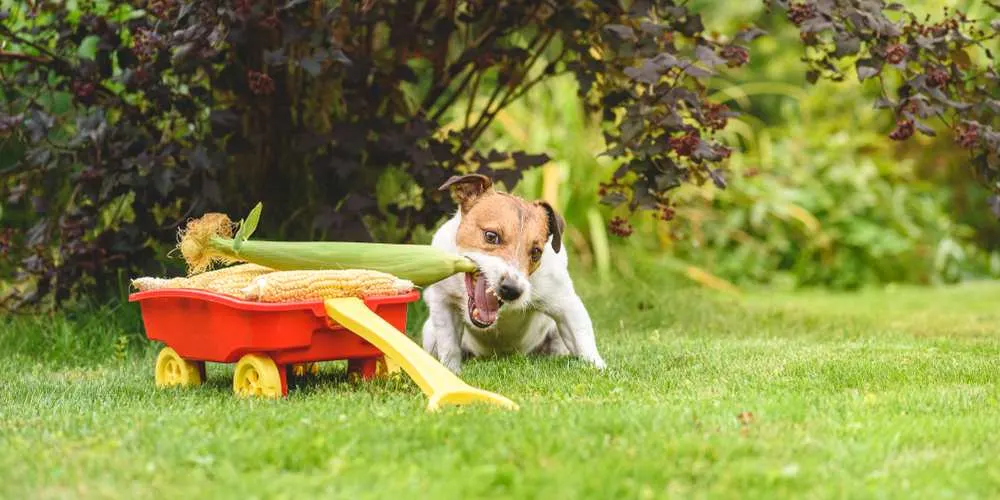
How To Feed My Dog Corn?
There are a few rules you need to follow if you want to feed your dog corn. After boiling or cooking a cob of corn, if you decide to treat your pet with some, scrape off the corn from the cob and feed it to your pet.
Make sure not to use any seasoning on the corn – this includes salt and butter! Because of artificial additives, salt can, as well as any other seasoning, cause some health problems for your dog.
Another way you can use corn to treat your canine friend is by making popcorn. The same rule applies as before, don’t use any seasonings, just feed it plain unsalted popcorn.
Make sure every corn seed you feed your dog with is popped. Corn that is not popped can’t be digested and may cause an upset tummy. Also, it can get clogged between your dog’s teeth, which may cause gum disease and tooth decay.
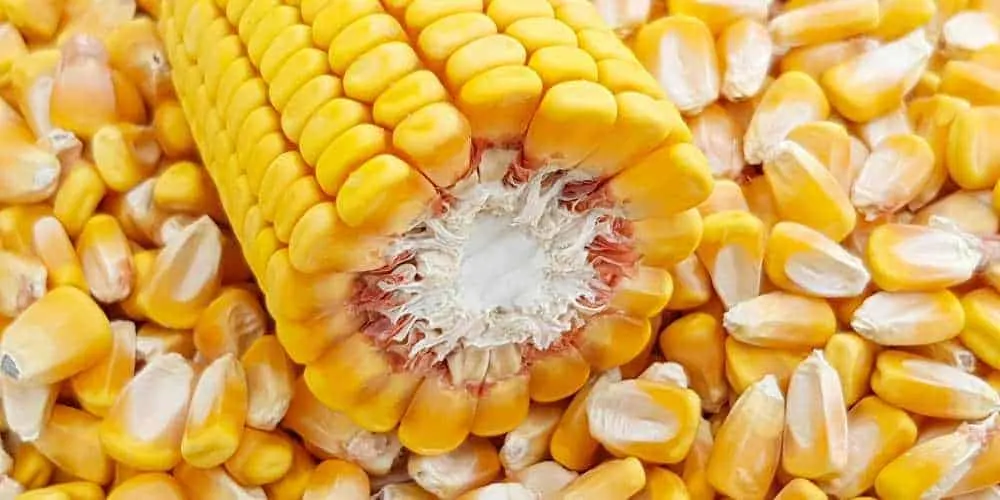
Can Dogs Eat Corn Cobs?
Dogs enjoy corn as much as we do, that’s for sure. But you need to be careful when feeding your dog this tasty snack. As we all know, dogs like to chew on just about anything, and corn cobs are no exception.
But they are a significant health concern, so it’s best to keep them out of your pet’s way.
Corn is a healthy snack for your canine friend. So the next time you’re enjoying corn on a cob, and you see your dog wagging its tail asking for some, don’t be afraid to share.
Just make sure to take the corn off the cob, and you can both enjoy the yummy snack!
Learn More: What Can Dogs Eat? A Comprehensive List Of Dog-safe Foods

